by Jenny Rose | Jun 28, 2018 | A Flourishing Woman, Body
After years of interest, last autumn I finally found a Tai Chi teacher. I approached learning Tai Chi with hopes and expectations about the benefits it could provide, but I was unprepared for the power of the practice and how important it would become in my life.
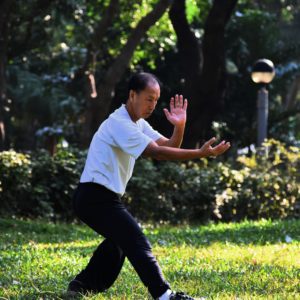
Photo by Mark So on Unsplash
Tai Chi is a form of Chinese martial art intended to teach defense and support health. It’s a multilayered practice, elegantly complex. Learning the gross motor movements is only the first baby step. One layer is connected to and leads to the next. Tai Chi is not a linear activity to learn from beginner to master, but a dynamic, fluid practice best approached with humility every time. It’s constantly challenging in new ways, depending on what my state of mind, body and spirit is on any given day.
The Tai Chi I practice is called 24 forms, all of which gradually blend into one smooth, flowing whole with practice. The forms have delightful, poetic names like The Crane, Windmills and Clouds.
Tai Chi is about finding one’s center, physically and emotionally, and building on the strength and balance residing there. In order to facilitate this, one crouches slightly with bent knees throughout the whole routine. This is obviously quite challenging, and for some people impossible. However, with proper foot position, body dynamics and a crouched stance, we can immediately feel the solid, stable center at the core of every Tai Chi form. Crouching for long periods of time immediately informs us about the strength of our ankles, knees, hips, hamstrings and quadriceps, information we might not otherwise receive as we move upright through the world.
Crouching assists with balance because it lowers the center of gravity. Many people take up Tai Chi to support balance issues, in fact. Several forms require balancing on one foot or another with the supporting knee bent. This, too, can be unexpectedly challenging. Once again, our body has a story to tell we might not otherwise hear as we move normally. I’ve always been aware I have sloppy posture, but I’ve been habitually lazy about doing much about it. Tai Chi demands I stack my bones on top of one another and tuck in my tailbone. If I don’t do that, I can’t balance. I notice I now move through the rest of my life standing tall, with more grace and confidence and better posture. I don’t slump, crowding my lungs and abdominal organs. I don’t tilt or lean. I know where my pelvis is and I stay over it. My back is happier. I feel better.
Every movement counts in this practice. Each foot is placed just so in order to support a fully centered crouched stance. Shoulders, wrists and elbows stay in line with several of the forms, which necessitates holding arms straight out from the shoulder. My arms ached for months as I built strength, and I’m a strong swimmer who works out in the pool once a week. One form requires placing toes down and heel up, and another the heel down. At times we turn on our heel, and at other times our toe. In one form we turn one foot on the heel and the other on the toe at the same time. Everything about Tai Chi leads me inward on a spiraling journey of deeper focus and mindfulness.
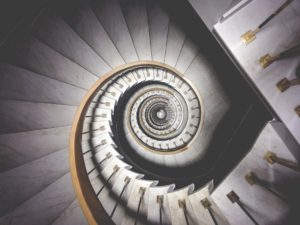
Photo by Ludde Lorentz on Unsplash
It’s amazing to practice over time and begin to feel the forms smoothing out into a cohesive routine with some kind of elegance and grace. Such fun and so rewarding. Then, however, the instructor started to talk to us about our eyes. It turns out every form requires a very specific eye gaze, often on our hand movements. I was doing well with balance, but when I took my gaze off the middle distance and looked at my hand in front of my face, I lost my balance. This was advanced balance. I added in the appropriate eye gaze and started all over again with balance.
Then, the teacher began to talk about breathing. Crap. I hadn’t even thought about my breathing! Breathing is connected to energy, and Tai Chi was originally a practice for working with energy as well as defense. All the forms have to do with pushing, pulling, deflecting or defending. Now that we had some mastery of the physical challenges, we began to work on feeling our field of energy and moving it with our bodies and breath. A push is an exhalation. A pull is an inhalation.
Breathing then leads to pace and rhythm. We practice Tai Chi to meditation music — very slow. Balancing on one leg is not so hard when you do it for two or three seconds. Balancing for sustained periods of time, especially with a bent knee, requires a lot more strength and, well, balance! Every movement takes far more concentration when slowed down. This is one of the few activities I’ve ever done where the goal is to slow down. We seem to be running faster all the time, overstimulated, overscheduled, multitasking, trying to earn more money, perpetually on call via technology. We’re all in pursuit of … something. What? Does anyone ever find it? Is it worth the cost of the chase?
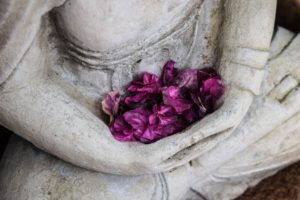
Photo by Chris Ensey on Unsplash
Tai Chi demands we slow down. In that slowness we discover our fatigue, our aches and pains, our half-healed injuries, our distractions and our distress and unmanaged feelings. We remember our center. We recover our balance. We make time to breathe.
Some people call Tai Chi a moving meditation, and I now understand why. When I’m practicing Tai Chi, I’m not doing anything else. When I’m walking or swimming my mind goes right on with whatever it’s busy with. Those activities are good for creative inspiration, prayer and processing feelings. Tai Chi, though, takes me to a deep, restful, quiet place of no thought, focus and present mindfulness, so rich and so empty. It opens the door for awareness, too, of the degree to which I’m captive to distraction. The instant I’m distracted by a sound or a stray thought, I lose my balance and center, I lose my breath, I lose the flow and I don’t know where I am in the forms. I think of myself as fairly focused, but I’m just as susceptible to distraction as anyone else, and I don’t want my life to become an uncontrolled blur of noise and stimulation in which I forget there’s anything but distraction. Tai Chi brings a precious and necessary balance into my days.
All these layers have brought health and healing into my life, but the greatest grace Tai Chi brings me is the opportunity to be in the body. I’m saddened by the ever-more strident body politics in our culture. I don’t remember a time in my life when it seemed so many people were locked in self-hatred and hatred of others based on some kind of physical characteristic. It reflects in our suicide and addiction rates, and it touches each one of us. We no longer honor the sacred feminine and masculine, we have few invitations to fully inhabit ourselves physically, and no one encourages us to honor and respect our physical form as it is.
Just like dance, Tai Chi calls us home to ourselves. My home is not nipped, tucked, plucked, lipo-suctioned, dyed, shaved, made-up, compressed, surgically reconstructed or uplifted. My home is my oldest friend, my most loyal companion, the loyal record keeper and diary of childbirth, breast-feeding, menopause, a lifetime of Colorado sun, slipped kitchen knives and barbed wire fence. My home is lines and wrinkles, lumpy thighs, softened breasts, grey hairs and thinning skin. This amazing, adaptable, resilient, hard-working body is the shelter and haven for my spirit.
I often move a chair aside, open the windows, take up the sheepskin rugs lying on the wide plank floor in my attic space, shut the door at the bottom of the stairs, turn on music and take off my clothes to practice Tai Chi. I like to look down at my bare toes and toe ring on the sloping grey-painted floorboards. I like to glance at my strong knees and make sure they’re in line with my heavy ankles. I like the gentle slope of my belly, cross-hatched with silver stretch marks, under which two children grew into life. I like to stack my bones carefully, tuck in my tailbone and feel the subtle realignment that opens up my center and my balance. I like the clench, pull, stretch and relaxation of my muscles. I like the combination of strength and loosening skin and flesh as I move my arms. I’m grateful for the ability to breath deeply, and the ability to sweat. I relish the air coming in the windows and touching my bared breasts.
We started with a large Tai Chi class, and over the weeks and months people dropped out, one by one. I suppose for some it wasn’t a good fit. For others it wasn’t a priority. Still others were discouraged by their physical limitations, in spite of the fact that the instructor was and is eager to modify the practice to accommodate anyone. One lady had trouble with balance but was unwilling to stand next to a chair for safety and support. Others were ashamed of their weight, their muscle weakness and/or learning a new thing in public. It made me sad. I think many would have benefitted if they could have moved past their shame and self-consciousness, and if they’d been willing to work with their physical reality instead of resenting and arguing with it.
Our Tai Chi group is small now, but we’re good friends. We laugh a lot. We learn from one another. We greet and part with hugs and affection. We enjoy the music; share our distractions, worries, aches and pains and support one another in centering, grounding, calming and mindfulness.
I’m entirely grateful.

Photo by Biel Morro on Unsplash
All content on this site ©2018
Jennifer Rose
except where otherwise noted
by Jenny Rose | Jun 21, 2018 | Emotional Intelligence, Feelings, Love
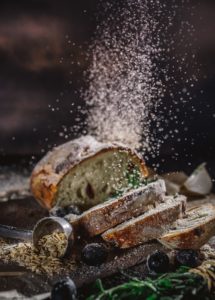
Photo by Helena Yankovska on Unsplash
In the farmer’s market on Saturday morning, we stood in line to buy bread. We did not stand in line to buy a peach raspberry pie and bread, but that’s another story (with a happy ending. The pie was worth it.) Next to the baker’s display was a booth set up by a local businesswoman who specializes in unique homemade dog treats. As my mother is owned by a dear border collie and I’m always on the lookout for something they might like, I idly checked out the booth while my partner waited in line (to buy bread, not pie.)
I found rows of attractively-packaged, carefully labeled, very expensive bags of dog goodies, most of which were vegetable-based and proudly labeled as containing “no animal biproducts.”
Sometimes I feel pretty despairing about the world. I’m sure this businesswoman is a well-meaning and hard-working person trying to earn a living in central Maine who cares about dogs. However, it would be good to avoid spelling errors on her labels and dogs are not vegetarians or vegans.
There is, in fact, debate among veterinarians and scientists about whether dogs are omnivores or carnivores, but recent research based on physiology suggests dogs are indeed carnivores. Many wild canines are apex predators. Many perform the vital function of carrion eaters and scavengers. Dogs are not vegetarians.
There are a lot of dark monsters walking the streets right now. Rampant narcissists, greedy capitalists and fanatical ideologists are slowly consuming the world. There’s another ogre abroad, though, one bathed in blue light and wearing angel wings, and that is our willful ignorance and denial of the physical and biological realities we live and die with, our inability to work elegantly with complexity and shades of grey and the cult we’ve made out of love and peace.
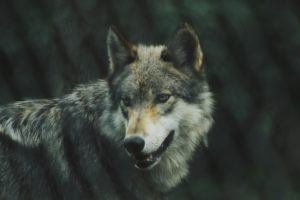
Photo by Michael LaRosa on Unsplash
One of my favorite writers on Medium, Kay Bolden, recently wrote a piece entitled Love is a Warrior, Not a Saint. She is absolutely correct. Love is not a saint. Love sees things clearly. Restricting our dogs to a vegetarian diet is not love. It’s animal abuse. If we love our dogs, we appreciate them for the magnificent companions and colleagues they are, and dogs are not vegetarians. If we love our dogs, we give them a nice raw, bloody, meaty bone now and then and we do not force them to struggle on a grain or vegetable-based diet and handfuls of supplements in order to address their nutritional needs. Wild canines form packs and hunt. They kill birds, rodents, rabbits and even larger animals, tear them apart with their teeth and eat them raw. That’s what a dog’s ancestry is. Refusing to accept that is not love.
Dogs have evolved with humans for thousands of years and have adapted to scavenge and forage amongst people. Most dog owners know that their pets will, if able, routinely eat all kinds of rubbish and frequently suffer digestive consequences. If humans are wiped out overnight in some kind of a plague, our dogs will consume our dead bodies, form packs, and begin hunting.
I despise what human beings have done to animals. Animal testing, the terrible practices of factory farming, our idiotic greed for things like rhino and elephant horns and furs, and our irresponsibility, cruelty, stupidity and malice have done no end of harm to the entire animal kingdom. We seem bent on destroying every habitat on the planet (often so people can feel self-righteous about how peaceful and loving they are as vegans and vegetarians, never mind that Big Ag wipes out hundreds of thousands of organisms and poisons the soil in every field it monocrops, not part of the natural process of life and death) as quickly as possible, leaving nothing but sterile wastes behind us. We do this. People. Homo Sapiens.
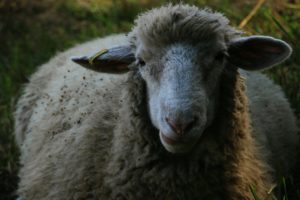
Photo by Jamie Morris on Unsplash
Bleating about love and peace and refusing to recognize carnivores, herbivores, the extraordinary complex system of Planet Earth and the necessity and function of all parts of it is just as bad as clearcutting the rainforest. Mother Nature is about prey and predator. When it’s healthy, the natural system is a complicated, dynamic dance of life and death involving countless organisms. Carnivores hunting and eating meat is not an act of violence or hate. Predators hunting prey is the natural order of things. Life on earth depends on it.
Somewhere along the way we seem to have lost our innate wisdom and connection to life. The modern age is all about arrested development. We’re like small children in sunny nurseries having a tea party with our stuffed animals and dolls. We’ve distorted love and peace into something prim and sweet, entirely artificial and entirely one-dimensional. Peace and violence are mutually exclusive. Love is entirely peaceful. Death is entirely hateful and violent. Love and peace are pretty. Love and peace are nice. They’re tolerant. They contain no animal “biproducts.”
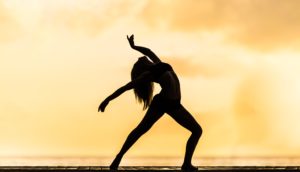
Photo by David Hofmann on Unsplash
What dangerous, infantile lies. Love is the face of the Divine, and the face of the Divine looks upon fire and flood, thunder and lightning, sand and ice and sea. The face of the Divine looks upon the musky violence of reproduction, the grinding bones and tearing tissue of birth, the vast cycles of predators and prey that encompass each layer of life from the smallest microbes to the largest animals. The face of the Divine orchestrates the checks and balances ensuring population control, which is often driven by disease, famine and drought. The Divine dances a passionate, sensual, joyful dance, knee-deep in blood, semen, bone, flesh, fat, hair, scales, feathers, rot, vomit and excrement.

Photo by Hermes Rivera on Unsplash
In the midst of this beautiful, intricate world it’s we alone who have the fantastic hubris to refuse to participate. It’s we who deny the very ground of our being, the substance and structure of flesh and bone and biology. We rant about inclusivity and equality while we steadily eradicate life on earth, self-destruct, and allow ourselves to be divided from one another, never pausing long enough in our fatal greed and grotesque need to win and be right to understand life and death already are inclusive and equal. We all must eat and drink, successfully procreate if our genetic material is to survive, and die. We’re all part of the magnificent turning wheel of life, whether we like it or admit it or not. We’ve allowed our contemptible ideologies, our fears, our ignorance and our absurd desire for the higher moral ground to weaken us and we’ve become the most dangerous form of life on the planet, not only to ourselves but to every living thing around us. Then we project our madness onto the animals who depend upon us, reward the criminals who market vegetarian dog food and call that love. We call that being peaceful.
No. That’s not my love. My love and compassion are bigger and wider than that. I love the glorious cycle of life and death, even if it means I dip my hands in blood and endure the stench of decaying flesh. I muster the humility to learn about interconnectedness and how to participate elegantly in life and death. I love myself and others for what genetics, evolution and biology make us. I work for peace. I can wield the tool of violence if necessary. I respect and welcome death, recognizing it as a sacred consort to life.
I will give a dog a bone.
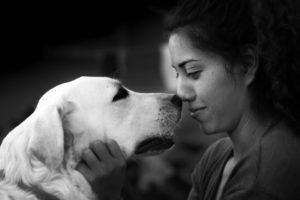
Photo by Kevin Quezada on Unsplash
All content on this site ©2018
Jennifer Rose
except where otherwise noted
by Jenny Rose | Jun 14, 2018 | Connection & Community, Emotional Intelligence

Photo by James Coleman on Unsplash
Saturday night I attended a monthly open mic event called The Coffeehouse. It took place in the basement of a local church, which is also where our Tai Chi group meets. People came from far and wide to participate. I was there to tell stories for the first time since I came to Maine.
My partner came with me, and I knew two other people there from Tai Chi. Otherwise, everyone was a stranger. I sat quietly in a corner and watched the place gradually fill up. I could see many of these folks were old friends. In fact, during the course of the evening I learned that The Coffeehouse has been happening for more than 20 years in that very basement, hosted by the same man since the beginning. I heard stories, both on mic and off, of cancer, divorces, moves, jobs, remarriage and grandchildren.
Cases were opened and out came guitars of every description. Musicians sat together, teaching one another chords and fingering, and playing together. Ragged sheet music, song lyrics and notes lay on every table. In front of the mic, I heard about being a cafe musician, playing music for weddings, and stories from a couple who composes, writes and performs music together, splitting their time between Arizona and Maine.
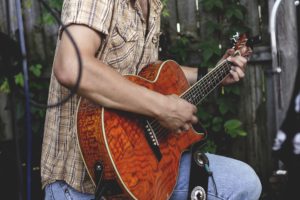
Photo by Brandon Wilson on Unsplash
One man stood up and read a short story he’d written. Another gave a hilarious rendition of a Shel Silverstein poem I used to read aloud myself as an elementary school librarian. Yet another read one of his own poems in between playing his guitar. A woman performed on her autoharp.
Many of the performers expressed nervousness, but each was volubly supported by the audience. Jokes were cracked, stories exchanged. Everyone was applauded warmly, including me.
When it was my turn, I stood before them, my heart throbbing uncomfortably in my chest, looking out at a roomful of faces I’d never seen before. I introduced myself briefly and told a short peace tale from China, followed by a longer story from Jane Yolen. The audience was generous, attentive. The poignant memory of other, more familiar audiences in my old place caught at my throat. As I wove the stories, I looked from face to face, speaking directly to each one as though we were alone. Their expressions softened as they entered into the stories with me, seeing what I was seeing and feeling what I was feeling. I know my own face wore exactly that expression as I listened to their music and songs.
Each performer took his or her fifteen minutes or so to share their art. It was a long night. In fact, it started about the same time I like to be heading for bed. Yet that evening fed something in me that’s been starving for three years. I had a strange sense of coming home, of belonging and kinship.

Photo by Andrew Loke on Unsplash
My partner and I talk a lot about community, how essential it is, how to create it, how to join it and how to support it. I believe, as humans, we must find some kind of community to meet our connection needs if we want to live well. We’re social animals, and I think we’re beginning to see the high cost of isolation and disconnection play out in suicide rates, violence and addiction.
The Coffeehouse clarified for me an aspect of community I haven’t really discerned before. Right now, the world is chaotic and increasingly complex. We’re faced with serious issues and changes we’re ill-equipped to deal with. I’ve been thinking about the local food movement, grassroots politics, permaculture, and alternative energy and housing through the lens of community. All of those issues are vitally important, and becoming more so by the day, but I’ve been skipping over the most important thing community can give us, the aspect that must be present, supported and nurtured before any kind of problem solving or effective organization can happen.
The Coffeehouse is, essentially, an adult playgroup. I heard nothing about diet, gun control, immigration, politics or climate change. I heard nothing about social justice or gender politics. We all shared the same bathroom, the same coffee and snacks. We all put a voluntary donation in the basket. Instruments were shared. We shared time, microphones, personal stories and creativity. There was no talk of cultural appropriation.
We laughed together.
We played together.
We were kind and generous with each other.
We took turns.
As I sat there watching it unfold, it occurred to me to wonder how we’re ever going to manage to address all the pressing problems in the world today if we can’t come together as human beings and play with one another first. How do we find our way to collaboration and cooperation unless we build trust and respect and are able to just have fun together? The Coffeehouse showed me humans at their best. Heck, I was at my best. In such a warm and supportive atmosphere, my social anxiety was not disabling. People talked to me, welcomed me, expressed appreciation for the stories and received my appreciation for their contribution in return. I recognized several who performed were more nervous than I was. None of us were hiding behind technological screens. There was no escaping a forgotten lyric, the wrong chord or symptoms of performance anxiety. One of the musicians talked ruefully about a new tremor in his hands that impeded his playing. We could all see it. He played anyway.
In the days since The Coffeehouse, I know I’ve found something I’ve been looking for since I came to Maine. I thought I just wanted a place to share stories again, and I do, but this gathering is about something much bigger than that. This is about mutual authenticity, creativity, contribution and play. It’s about friends. It’s about celebration and connection in the midst of a dark and stormy time.
I can hardly wait for the next one.

Photo by rawpixel.com on Unsplash
All content on this site ©2018
Jennifer Rose
except where otherwise noted
by Jenny Rose | Jun 7, 2018 | Aging, Connection & Community, Emotional Intelligence
Have you ever had a dream of finding an undiscovered room in a familiar house? I have, several times. I like those dreams. A large piece of furniture moves aside, or I walk into a room I know well and find a new door in it.
Last weekend, my partner and I went to our small local theater and I saw Book Club while he went happily off to Deadpool. (Honestly, I’m so tired of comics, superheroes, space adventures, special effects and unending battles and chases. Whew. It felt good to say that.)
The movie was a relief. I didn’t have to spend most of it with my eyes shut trying to filter out the entirely overstimulating and, at the same time, boring hyperactivity, and it wasn’t excellent. It didn’t require anything from me except to sit back and relax.
No spoilers and this is not a movie review, but Jane Fonda tries way too hard. Instead of marveling at her artificial youthfulness, I felt rather sorry for her. There was also a lot of unnecessary drinking. It didn’t add anything to the story. Some of the humor was more of a wince than a chuckle, but there were some truly funny moments. The writing was a little inconsistent. It’s a movie about connection and being an aging woman.
Overall, I could relate to these four women and I found the movie oddly touching in an unexpected way. I’ve been thinking about it ever since, in fact, trying to understand why it made me feel so bittersweet.
It has to do with giving up. Well, not really. Not giving up, exactly, but settling. No, that’s not quite right, either.
It has to do with gradually forgetting to entertain possibility.
That’s better.

Photo by Joshua Rawson-Harris on Unsplash
We inhabit our lives like a house. It’s a finite space, and we’re intimately familiar with the floorplan, the closets, the windows and the doors. Our house is defined by ourselves and the way we live, and it’s also defined by the external world and people around us. Outside our house is a world where all kinds of potential physical and emotional harm crouches, waiting for us to take a risk and leave our shelter. Outside our house is a wilderness of Unknown.
When we’re young the house of our life is new and exciting. We experiment using the space in different ways. We begin to figure out what we like and don’t like, what works well in our lives and what doesn’t, who we can live with and who we can’t live with. We gradually accumulate furniture in the forms of memories, scar tissue, hand-me-downs, beliefs, and new stuff we find all by ourselves.
The years go by and we learn a lot (hopefully) about the way the world works and who we are. We notice an ever-enlarging population of people younger than we are.
Then, one day, we’re in our fifties. Then our sixties. Then our parents are old. Not older. Old. How did that happen? Then our kids are as old as we were when we had them. It’s entirely disconcerting. We begin to think of ourselves as middle-aged and secretly feel older than that a lot of the time. Then, if you’re a woman, comes menopause, which, just as the onset of menstruation changed everything in the beginning of our lives, remodels our house.
For one thing, we need to tear out the heating system and replace it with cooling and fans.

Photo by Ian Espinosa on Unsplash
By this point in my own life, I’ve made a lot of choices and taken notes on how they worked out. I’ve made decisions about what I will and won’t do, and about what I am and am not interested in. I’ve decided what dreams to discard and interests to drop, because I’m out of time, energy or both. I’ve decided I know exactly who I am, what I’m capable of and what I need and want. I have an entirely private (because it’s shameful) list of things I’ve given up on.
Book Club speaks to the ways in which we begin to limit possibility as we age. In my case, it has nothing to do with age, though. I’ve been slamming doors behind me my whole life. When I was 18, I turned my back on high school. When I was 20, I left residential college, never to return. When I was 21 and got married, I gave up on dating or looking for love. When I was 27 and had my first child, I stopped dreaming of freedom and adventure.
And so on.
Of course deciding we’re never going to do something ever again practically guarantees the Gods will throw it back to us sooner or later, giggling. Now when I hear myself say, “Never again…” I can smile.
An even darker aspect of refusing possibility has to do with the dreams and desires we’ve never fulfilled. I’ve always struggled with financial scarcity. I tell myself nearly every day I’ll never be financially successful, and it doesn’t matter, because I have a good life, I have what I need, I’d rather have my self-respect and integrity than be rich (note the belief one can’t have both), and it’s not a big deal. I say all those things to myself because I don’t see any possibility of financial security. If I haven’t found it following all the rules and working so hard, then maybe I don’t deserve it, or it’s just not something I can earn or have. I don’t want to live the rest of my life hoping for something that never happens.
The story I tell myself is I’d love to find a great job where I could contribute my talents, do meaningful work, be part of a team and get adequately paid. I’m always watching and listening for that job. But I know I’m too old, the things I love to do will never pay well, the kind of thing I’m looking for wouldn’t be here in rural Maine, and I’ll struggle to maintain adequate housing and feed myself forever.
If there’s no possibility, I can work on accepting what is and try to be peaceful.

Photo by Nathan Dumlao on Unsplash
Book Club was redemptive. It reminded me possibility still exists for me. I’ve done things in the last five years I never imagined doing in my wildest dreams. Why do I think it’s all over now? Why do I make so many iron-clad assumptions about the size and shape of my house? Why am I deliberately trying to ditch my dreams? Why do I think of myself as a food item on the pantry shelf with an expired sell-by date?
Am I too old and jaded to invite miracles? Am I too worn out to move a piece of furniture (a bookcase, what else?) and discover a door behind it I never saw before? I know I’ve yet to discover my highest potential.
Maybe I’m just not very brave. I don’t want to fail anymore. I don’t want to be disappointed or feel I’m a disappointment, ever again. I don’t want to be let down, or hurt, or stood up or rejected. I don’t want to look like a fool. (I don’t mind being a fool, but I don’t want to look like one.) I don’t want to be scared.
I don’t want to play power games with people.
Perhaps this is the crust of old age, this gradual accumulation of weariness, scar tissue, limiting beliefs, and physical changes that keeps us sitting in our familiar, safe house, where the edges and boundaries are well-defined and unchanging and we control the dangers of possibility.
Some people successfully shut out life, or shut themselves away from it. I’m never (there I go again) going to be able to pull that off, though. I’m too curious and too interested. An overheard remark, a movie, a conversation, a book or even a song lyric invariably comes along and kicks me back into motion when I’m threatening to lock myself permanently in the predictability and safety of my house. Then I begin to write, and the walls waver and shimmer, new doors and windows appear, a corner of the roof peels away to show me the sky, and I remember I’m still alive, still kicking, still wanting and needing and still, in spite of my best efforts, dreaming of possibilities.
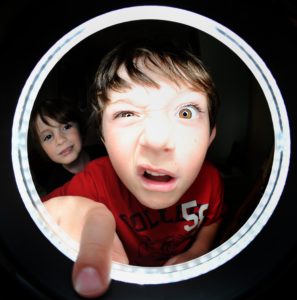
Photo by frank mckenna on Unsplash
All content on this site ©2018
Jennifer Rose
except where otherwise noted
















